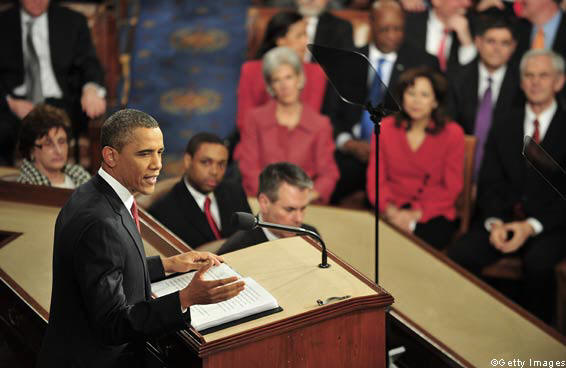Obama puts tax at heart of election

Barack Obama laid down the battle lines for the presidential election as he promised a “fairer” tax regime on the day Mitt Romney, the leading Republican contender, revealed that he paid federal income taxes at an effective rate of just 13.9 per cent in 2010.
The comparatively low rate reflects the fact that most of Mr Romney’s income is taxed as capital gains, an issue that Mr Obama tackled head-on in his State of the Union address on Tuesday night.
The US president said tax reform and budget reduction should be guided by the principle that anyone with annual income of more than $1m should pay a minimum effective tax rate of 30 per cent.
Mr Obama’s benchmark – the Buffett rule, named after Warren Buffett – says the richest Americans should not pay tax at a lower rate than their secretaries, a policy dressed up by inviting the billionaire investor’s long-time personal assistant to watch the address from the first lady’s box in Congress.
“You can call this class warfare all you want. But asking a billionaire to pay at least as much as his secretary in taxes? Most Americans would call that common sense,” he said.
The address also included proposals to cut taxes for US manufacturers operating factories at home and to remove incentives in the tax code for outsourcing production overseas. In addition, the administration is proposing an initiative to undercut incentives used to attract US companies offshore, by having US companies pay a minimum tax on their overseas profits.
“We will not go back to an economy weakened by outsourcing, bad debt and phoney financial profits,” Mr Obama said in his prepared remarks. “Tonight, I want to speak about how we move forward, and lay out a blueprint for an economy that’s built to last – an economy built on American manufacturing, American energy, skills for American workers and a renewal of American values.”
In the Republican speech in reply, Mitch Daniels, the Indiana governor, said Mr Obama had not caused the economic problems but had made them worse.
“In three short years, an unprecedented explosion of spending, with borrowed money, has added trillions to an already unaffordable national debt. And yet, the president has put us on a course to make it radically worse in the years ahead,” he said.
“The president’s grand experiment in trickle-down government has held back rather than sped economic recovery,” he said. “He seems to sincerely believe we can build a middle class out of government jobs paid for with borrowed dollars. “
Responding to intense pressure from his Republican challengers, Mr Romney released 547 pages of documents on his website on Monday detailing his tax affairs for two years.
For 2010, he paid about $3m in taxes on income of $21.6m, largely derived from investments during his time as head of one of the US’s most successful private equity firms. For 2011, Mr Romney expects to pay $3.2m at a rate of 15.4 per cent.
Patrick Gaspard, executive director of the Democratic National Committee, said the returns showed Mr Romney paid a lower rate than “teachers, firefighters and police”.
More than 16 per cent of Mr Romney’s income was given away, a large part to the Mormon church. Mormons are expected to pay 10 per cent of their income in tithes to the church.
The White House outlined the Buffett rule last year, but the fact that it coincides with release of Mr Romney’s details lifts the salience of the issue.
Mr Romney has been struggling to halt the electoral surge of Newt Gingrich, the former speaker of the House of Representatives, who won a crushing victory in South Carolina at the weekend.
In a debate on Monday in Tampa, Mr Romney pointed out that he would have paid almost no federal taxes under Mr Gingrich’s plans to scrap capital gains tax altogether.
Copyright The Financial Times Limited 2012. http://www.ft.com